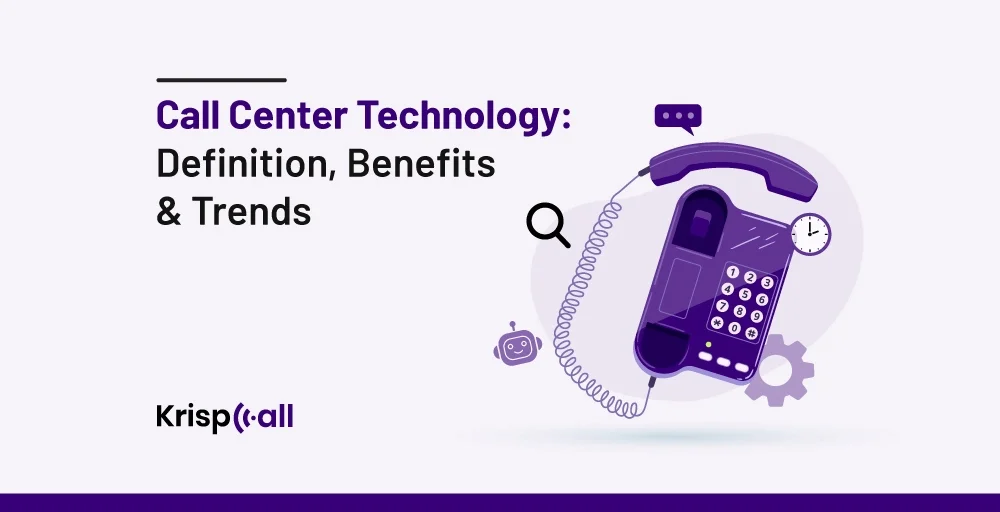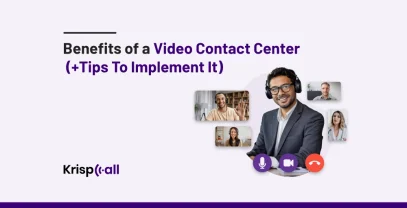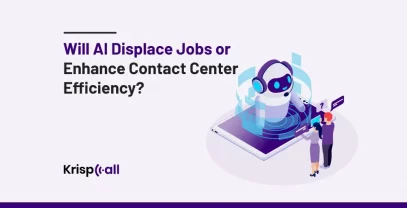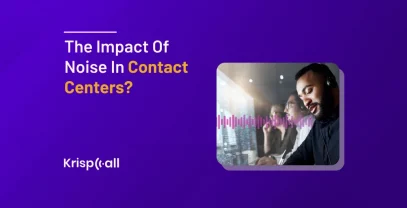Customer happiness and satisfaction evolve the businesses. However, due to outdated and poor call center technology, call center managers fail to keep customers satisfied and ecstatic due to lost calls and long wait times.
Customers love those call centers that offer fast, personalized, and omnichannel service, which can easily be achieved with today’s ✅Advanced Call Center Technology.
Technology in call centers is vital to optimize call routing and handling, guaranteeing call direction to the right agents based on skills and expertise.
In the present times, the world is evolving with innovative ideas that have brought AI and automation. Likewise, call center technology is evolving with AI and ML technologies that lead to an effective customer experience.
This blog will discuss call center technology, its components, benefits, emerging trends, and future, followed by a relevant conclusion.
🔑 KEY HIGHLIGHTS
- Call center technology provides specific technologies to help run a call center smoothly and efficiently.
- Call center technology can benefit you by automating repetitive tasks, simplifying processes, saving costs, and continuously improving customer service using the latest call center technology.
- The emerging trends in call center technology are Automation and AI, Omnichannel, Analytics, and reporting.
What Is Call Center Technology?
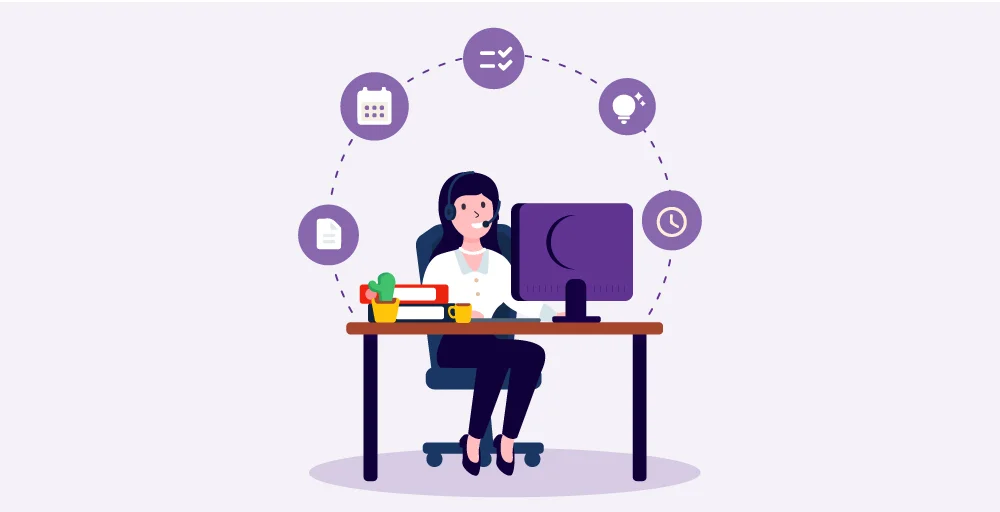
Call center technology is a solution provider to call centers that provides specific technologies to help run a call center smoothly and efficiently. The call center systems technology minimizes agent idle time between calls and increases the number of live connections, increasing overall call center efficiency. It is a collection of hardware, software, and tools that aid call centers in making both inbound and outbound calls.
Moreover, those hardware and software tools help customer-facing departments and agents to manage and optimize their work smoothly through automation, customer relationship management, assessing customer behavior, and some call center performance metrics.
The call center technology routes and manages all customer engagements, offering swift resolutions and the best service. The technology encompasses omnichannel functionalities, such as voice, email, chat, social media, and SMS, to ensure meaningful and persistent customer interactions.
Likewise, some cloud-based call center technology solutions include functionalities, such as IVR features to speed up self-service, reduce agents’ complex issues, and AI-powered chatbots to engage customers in real-time, using customer data to offer detailed recommendations.
Call Center Technology Components
Call center technology is very important in enhancing productivity and offering excellent customer support in any call center. Call centers use VoIP, IVR, and AI. In the following section, learn more about more significant call center technology components in detail.
VoIP (Voice over Internet Protocol)
VoIP is the most critical component of call center technology, providing feature-rich, high-quality calls through the Internet. Unlike traditional phone systems, VoIP integrates unified communications, such as calls, voicemail, SMS, and fax, to enhance customer interaction.
VoIP offers security and flexibility in call centers by routing calls over secure broadband connections, which can be accessed through software phones and mobile devices. It offers advanced features, including auto attendants, call recording, intelligent call routing, and analytics to improve customer conversations.
CRM integration
CRM (Customer relationship management) is an invaluable component that empowers agents to easily access the details, such as order histories, support tickets, and product preferences, captured by CRM anytime they need.
It also unites data with calls, enabling functions like intelligent call routing, improved reporting, simplified workflows, and proactive outreach in a centralized platform. This approach optimizes workflows, allowing personalized interactions and leading to intelligence-driven customer service.
Therefore, CRM integration reduces agents’ time spent searching for information, helps managers achieve data-backed recommendations, and gives customers the best experience.
Skills-related routing
Skills-related routing is a component of call center technology that automatically sends customer queries to agents with the skills to operate them to prevent misrouted calls.
It uses pre-configured agent skills profiles to connect every customer to the right agent or department. This practice reduces transfer time and enhances first-call resolution rates, addressing customers’ issues swiftly without repeating information to multiple agents and improving call center efficiency and customer satisfaction.
IVR
IVR stands for Interactive voice response. It gives the initial impression when someone calls your department. It automatically greets customers and intelligently routes calls using voice prompts.
For instance, once in a lifetime, when you call any call center, you probably hear, “Thank you for calling us. Press 1 for sales, Press 2 for billing questions”. The menu options you heard route your call toward the correct department or agent, improving customer satisfaction.
Screen Pop
Screen pop is a component of call center technology that integrates phone and CRM systems to show customer details when calls come automatically. It helps agents personalize interactions by letting them know who calls them before answering.
Furthermore, it offers complete information on past interactions and customer history on agent’s desktops. Agents can comprehend the relevant information to make conversations more personalized and meaningful.
Predictive dialer
Predictive dialing helps call center agents connect to potential customers by automatically queuing and placing calls. Thus, they no longer have to go through long lead lists and make calls manually.
Its algorithm detects when the agent finishes current calls and automatically moves the call to the next numbered queue. Likewise, it identifies an agent’s availability and calls back automatically without the agent’s intervention, increasing the agent’s productivity.
Call analytics
Call analytics provides information on customer interactions to ease making decisions faster and better. Managers can identify which departments and channels perform best or which require improvement from the real-time, historical, and entire call analytics.
Depending on real data, call analytics help managers predict call volume and metrics and route calls. It also helps you get out-of-the-box reports and establish your own to measure what you need anytime.
AI conversation
AI conversation uses chatbots and intelligent virtual assistants to provide automatic and personalized self-service options. Its chatbots offer 24/7 solutions via natural language conversations, reducing call volumes for agents.
Its intelligent virtual assistants analyze user history and preferences to make appropriate interaction recommendations. With AI-automated assistance, call routing is simplified, and customer service is increased.
Call Queue
When there are more call volumes than the agent’s capacity, the call queue ensures that the customer has a good experience while experiencing inevitable wait times. It announces the wait time for the customer and plays custom music or recorded messages so as not to bore any customers.
It sets appropriate expectations around delays while deploying features to reduce waiting times. It also automatically distributes calls instead of letting agents answer calls manually.
Voicemail to Email
Voice to email integration helps guarantee that customers’ inquiries are addressed. Depending on urgency and staff availability, it automates email alerts with audio recordings and voice-to-text transcripts to let managers and agents quickly proceed to the next steps.
It lets call centers meet with their SLAs and speed up resolution as the customers get callbacks immediately, addressing every opportunity as a catalyst for giving the best customer service experience.
Benefits Of Using the Latest Call Center Technology
The latest call center technology significantly benefits businesses and call center agents. Some major benefits of using the latest call center technology are:
- Automate repetitive tasks: The latest call center technology offers modern service practices, such as callbacks, that reduce the time and effort required for mundane or repetitive tasks. It offers customer data like history recordings to optimize customer interactions.
- Simplify processes: The latest call center technology simplifies processes by offering AI-driven tools, natural language processing, and cloud-based technologies to automate daily tasks such as answering FAQs and giving more targeted responses to customers.
- Save Costs: You don’t need large upfront investments, as the latest call center technology deploys new features without cost. Also, This technology uses self-service options like IVR that reduce the requirement for live agents, minimizing costs.
- Persistently improve: With the latest technology, agents can focus on providing quality service to customers, providing insights into customer preferences, feedback, and behaviors. Managers use data and analytics to improve flaws persistently and enhance customer satisfaction.
Emerging Trends In Call Center Technology
As the world evolves for the better, call center technology trends are also emerging. Here, find out the trends of the latest call center technology:
Automation and AI
The rise of automation and AI helps human agents solve challenging problems and queries with chatbots and intelligent virtual assistants. Chatbots use natural language processing to comprehend complicated queries, and AI helps to make the answers sound better.
The AI’s Automated call routing can evaluate historical conversations and customer data to identify areas required to direct incoming calls effectively. Likewise, speech analytics helps routing by finding real-time call dialogues.
Omnichannel solutions
Generally, the flexibility of how customers engage with brands is very crucial. Call centers have centralized systems that unify functionalities across channels such as email, social media, and email for agents to reference to bring flexibility to customer engagement.
Emerging cloud computing technology allows omnichannel solutions to integrate various channels into a single system. These solutions enable the visibility of chat histories with the same customer, who later communicates with the agent via phone.
Security, ethics, and transparency
Customers expect call centers to provide compliance functionalities to keep their personal data secure and private. Likewise, AI, the emerging technology, has the potential for that. However, if it fails, it risks unfair treatment due to bias in the technology.
Therefore, AI should be designed carefully to mitigate such issues. Besides, AI helps call centers build trust and give customers a way to address any problems. Although AI is trending in customer service, it is imperative to focus on building trust and transparency with customers.
Analytics and Reporting
Nowadays, many call centers use innovative call center technology, such as use speech, text, and QA analysis tools, to decode recorded calls and online conversations and identify areas for improvement.
They use those analytics and reporting from customer interactions to identify actionable customer insights, preferences, and worries. Connecting AI with operational analytics helps identify inefficiencies and understand improving customer interactions.
Future Of Call Center Technology
Undoubtedly, call center technology is moving forward, offering more automation, integration, and self-service choices for customers. As far as we can comprehend, there is a promising future for call center technology as its demand is growing daily.
AI and ML are the future of call center technology. AI tools, such as chatbots and virtual assistants, will handle customers’ daily inquiries, whereas human agents will still be present to fix challenging problems. Call center technology’s future will be a hybrid model, mixing automation and personalized service.
Although AI will advance call center activities, agents must be flexible and listen to customer feedback to adapt to innovative call center technology changes and deliver excellent customer experiences.
Moreover, it is also crucial to constantly refine strategies by call center technology to focus on customer-centric evolution.
KrispCall: The Best Call Center Software With the Latest Technology
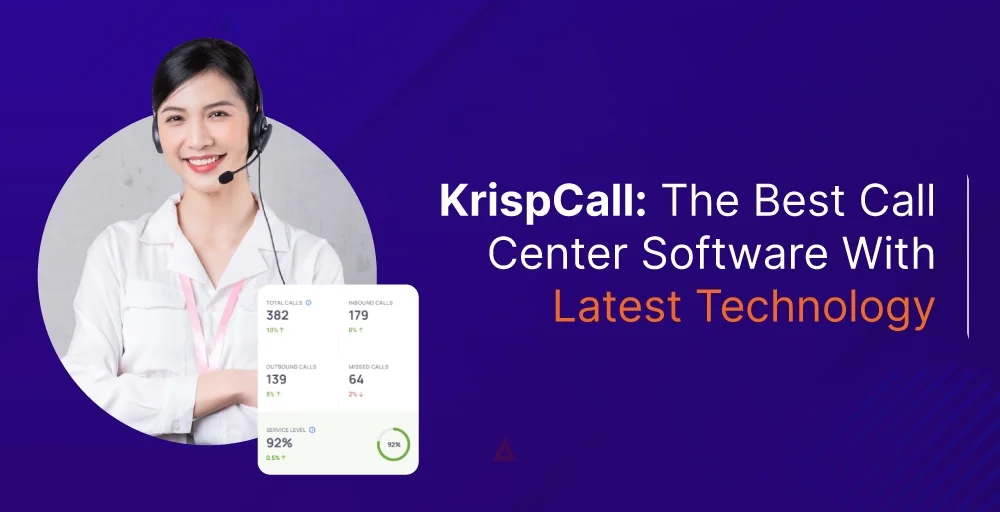
Despite the growing call center market today, KrispCall stands out as the best call center software with its latest technology, such as data-driven, real-time monitoring, analytics, and reporting. KrispCall is a cloud-based telephony system that enhances your call center’s performance, increases revenue, and improves customer satisfaction.
KrispCall offers many merits, including 24/7 human support service that eventually fosters strong customer relationships. It also provides an extensive range of features, like a unified callbox, shared number, call routing, simultaneous call handling, and virtual to mobile phone numbers, available worldwide.
Moreover, you can get all the KrispCall features in affordable pricing plans and a 99.999% uptime guarantee. So, why wait more? Go and Book a Free Demo with KrispCall
Final Thoughts
Call center technology offers technologies to run a call center smoothly and efficiently. The technologies that call center agents mostly use are VoIP, CRM integration, skills-based routing, IVR, screen pop, predictive dialer, call analytics, AI conversation, call queuing, and voicemail to email.
Those technologies benefit call center technology by simplifying call processes, automating mundane tasks, saving costs, and consistently improving customer service. Call center technology is emerging with trends like Automation and AI, Omnichannel, analytics, and reporting. Particularly, AI and ML seem to be the future of call center technology, which will be very helpful in delivering exceptional customer experiences.
FAQ
What are advanced call center technologies?
Advanced call center technologies are modern technologies that have completely transformed how people communicate and call centers provide customer services.
What are the different types of call centers?
The different types of call centers are:
- Inbound
- Outbound
- Automated
Do call centers use CRM software?
Yes, call centers use CRM software to track customer engagements and preferences and enhance customer service effectively.
What’s the difference between a call center and a contact center?
The difference between a call center and a contact center is the use of different type and number of channels.
What equipment is required to run a call center?
The equipment required to run a call center are:
- Computers
- Headsets
- Internet Connection
- Software
- Call monitoring tools
- Workforce management tools

